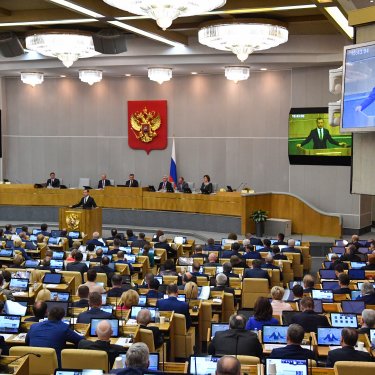New spate of repressive laws in Russia

Reporters Without Borders (RSF) condemns the latest attack on press freedom in Russia, where the Duma (the parliament) last week passed amendments under which failure to remove prohibited content will be punishable by imprisonment. More draconian legislation is being considered.
Читать на русском / Read in Russian
Long dubbed the “mad printer” because of the furious pace at which it produces repressive laws, the Duma has again been living up to its nickname since the end of the summer break.
On 20 September, the Duma’s members unanimously passed two bills imposing harsh penalties for failure to take down or retract content within the specified deadline after it has been banned by a court. Their approval by the upper house and ratification by Vladimir Putin are regarded as just a formality.
These amendments introduce a sliding scale of penalties for violations. Entities can be fined up to 200,000 roubles (2,500 euros), ordinary individuals can be jailed for up to one year, and officials or representatives of “commercial or other” organizations can be jailed for up to two years.
“These latest amendments will make Russia’s draconian defamation laws even tougher,” said Johann Bihr, the head of RSF’s Eastern Europe and Central Asia desk. “The totally disproportionate penalties will inevitably reinforce the already oppressive climate of intimidation and further restrict debate on matters of public interest.
“As a result of these increasingly repressive laws, Moscow keeps straying ever further from its international obligations and the principles proclaimed in the Russian constitution. It is high time to halt this disturbing trend.”
Since April, the authorities have been able to block any website that has not removed content deemed to be defamatory. Under another law due to take effect at the end of this month, search engines will be subject to fines if their results still include links to banned content.
The telecommunications ministry has meanwhile proposed that reference to a judge should not be needed in order to block any content deemed to “support or justify committing an extremist act or terrorist act or both.” This wording is even vaguer than the one already widely used to jail people for online posts of political or social content.
The legislation applicable to news and information has been getting steadily tougher ever since defamation was recriminalized in 2012.
“Offending the feelings of believers,” “propaganda in favour of non-traditional sexual relations” and “separatist propaganda” have all been criminalized. Media outlets can be branded as “foreign agents.” The grounds under which websites can be blocked without a court order keep on being extended. Technical intermediaries have increasingly been brought under control.
Russia is ranked 148th out of 180 countries in RSF’s 2018 World Press Freedom Index.



